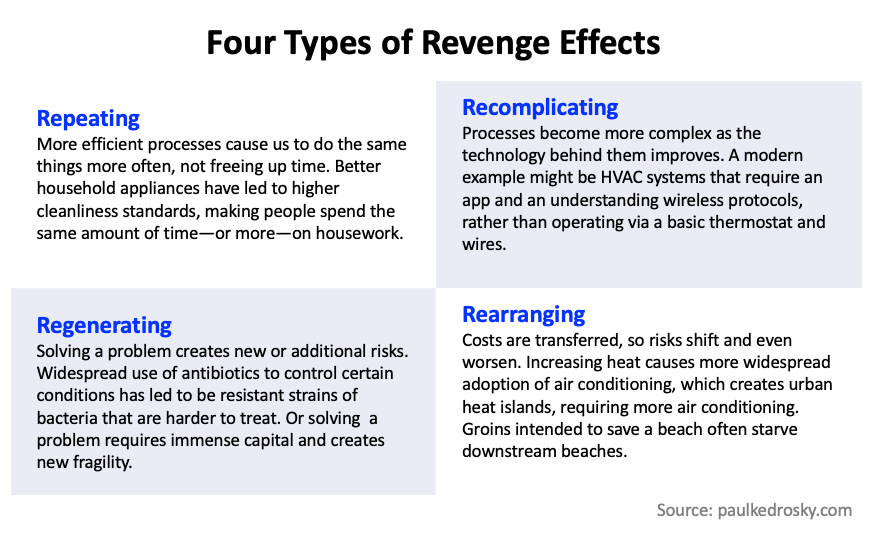1/ Consider becoming a supporter, if you're not already. There it lots more members-only stuff coming, including interactive risk simulations, etc.
2/ Know someone who might like to read this? Share it with them via the links at the bottom of the post.
3/ I have a big new piece coming out Thursday on GLP-1s, those anti-obesity drugs getting so much attention. Weirdly, I think they're still badly misunderstood, as I will explain.
01. Revenge Effects, Fast Fashion, and EVs
Years ago Edward Tenner coined the term "revenge effect" to describe how technology often has unintended consequences that reduce the benefit of the technology itself. I wrote about a variant of this idea in my posts about Stanley Jevons (parts 1 and 2), on how making energy cheaper can cause more of it to be used.
In this note, we abstract up a little and talk about revenge effects in more general terms. First, however, a definition:
Revenge effects are ways that technologies can solve one problem while creating additional worse problems, or create new types of problems, or shift the harm elsewhere altogether. As Tenner wrote as his book's subtitle, technologies can "bite back".
This applies to all forms of technology, of course, not merely computer ones, even if those revenge effects can come to mind more readily. We see, for example, how the Internet has created a host of new problems, despite its benefits, from changes in youth socialization, to mindless distractions, to religion and political radicalization. Similar effects can be seen playing out in artificial intelligence, mobile technologies, and on and on.
We often see revenge effects in life sciences. For example, while antibiotics have been among the most important forces extending human lifespan in the last hundred years, their overuse has helped create antibiotic-resistant bacteria. Similarly, while joint replacement technologies have improved millions of lives, a relentless search for better approaches has led people to install newer technologies, only to end up with terrible side effects, like metal in the bloodstream. It isn't to say that these innovations were without merit, but that they had unanticipated consequences, sometimes very serious ones.
Types of Revenge Effects
Loosely, Tenner characterizes four types of revenge effects, as follows:

We see each of these, all the time. While no individual revenge effect is predictable in all but the most trivial cases, there are two points worth noting here:
- The myth of infinite productivity.
The myth of infinite productivity is the doomed quest on which many people find themselves driven by the idea that with the right tools they would liberate more time and be more ... productive. But in the limit, even in the one-party case, this cannot hold: the more productive I become, the more things I do, which consumes more time, and I end up feeling unproductive again. And in the multiparty case, one person's improved productivity is another person's lost time: Your use of generative AI to produce emails leads you to produce more emails, costing me more time. And if I use AI to read your AI-created emails, we just end up in a productivity-eating death spiral of ... productivity. - Change is its own enemy
Devices are becoming an increasingly important part of our lives, especially electronic ones. But while useful, they have insidious characteristics, including their rapid obsolescence and poor repairability, as well as the tendency for a single incident to cause them to be discarded. Our gains in terms of convenience have become losses elsewhere, especially in terms of increases in electronic waste, but all kinds of waste as well, like we have seen with growing amounts of discarded fast fashion.



